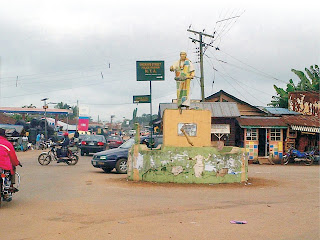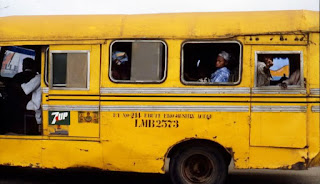Drama at Ooni's palace:
Wives, children barred from
The final burial rites of the late Ooni of Ife,
Oba Okunade Sijuwade, Olubuse II, was performed
on Friday, but his wives, children and family
members were unable to pay their last
respects as they were barred from the
programme.
Some people who had expected to see the
body of the monarch lie in state were
disappointed as his remains were neither
brought out for people to see nor was any
casket displayed during the burial service.
A lot of dignitaries were in attendance like
Vice-President, Prof. Yemi Osinbajo, Rear
Admiral Akin Aduwo (retd.), Gen. Alani
Akinriande (retd.), Senator Babajide
Omoworare, Ondo State Governor Olusegun
Mimiko.
Traditional prayers were offered for the late
monarch by Tadimole Awo Ilare, Chief Faloba.
The event was conducted in less than three
hours.
A source at the palace said that no member of
the royal family was allowed to see the
remains of the monarch since he was brought
back to the palace.
He said:
"As we are holding this
interdenominational service here, those
concerned are performing their own
rites inside the palace where the body
is kept.
"You can see that the gates of the
palace are locked and nobody is
allowed to go inside. Nobody can see
him again except those who will bury
him.
"The wives and children were not even
supposed to see his corpse at all but
tradition was broken this time around
because he (Sijuwade) died in London.
But no family member can see him
again. Those performing the rites are
there now and they will complete it
today (Friday). He will be buried in the
middle of the night, but nobody will be
there apart from those who will lower
him into the grave."
The source said those who saw the bodies of
the previous Oonis were attacked by smallpox
and did not survive the ailment.
A monarch in Osun State, who spoke on the
condition of anonymity, disclosed that
traditional rulers of the town went to various
shrines, including the Obalufon shrine in Ife to
perform some rites for Oba Sijuwade on Friday.
He said the traditional rulers later went into
Ooni's palace shortly before an
interdenominational burial service for the king
commenced on the palace premises.
The monarch said:
"Nobody can see the Ooni, not even the
US President, Barrack Obama. We are
with him. It's only the initiates who can
see him. His wives and children cannot
see him."
During the service, the Preacher, Bishop of Ife
Diocese of Anglican Communion, Rt. Rev.
Oluranti Odubogun, said the monarch's demise
demonstrated that every mortal man would die
no matter their status.
He said:
"Baba has gone. He will stand before
the King of Kings who will judge what
he did while here on earth.
"Some persons have started jostling to
succeed him now but we must all
remember the judgement day when we
will give account of all that we did on
earth.
"I urge you to make today a memorable
one and give your life to Christ. Jesus
is the only way, accept him today."
As the interdenominational service was about
to start, worshippers of Oro cult in Ife, also
called Isoro, stormed the venue and attempted
to stop the service. The worshippers claimed
that it was a sacrilege to hold an
interdenominational service for the departed
king. And as the service went on outside the
palace, the traditional worshippers sang and
danced inside the palace.
As part of the palace tradition and custom,
women are forbidden from entering the palace
while traditional rites are being performed for a
passing monarch.
During the interdenominational service, sounds
of gunshots suddenly rent the air, making
some of those present at the service run for
safety.
A source said that more gunshots would be
fired later in the day, as from 5.00 pm, adding
that curfew to last for seven days would start
by 4.00 pm on Friday.
One of the palace chiefs, Sooko Adelugba, said
that many parts of the town had already been
deserted by residents who were eager to
comply with the curfew as announced by the
palace.
One of the initiates told one of our
correspondents who had tried to interview him
that it was an abomination to speak publicly
of traditional rites offered for a departed Ooni.
Meanwhile, fresh facts have emerged as to
why the monarch would be buried beside the
immediate past Ooni, Oba Adesoji Aderemi.
The mausoleum is said to be located at the
rear end of the palace.
A palace source said the final resting place of
Sijuwade had been constructed in
a mausoleum inside the Palace of Oba
Aderemi, adding that the cemetery inside the
palace is called Ile Nla (mighty house).
The worshippers of Oro cult in Ife, also called
'Isoro', clashed with residents who were
erecting tents for the interdenominational
burial service at the frontage of Enuwa Palace.
A prominent chief in Ife, who spoke on the
condition of anonymity, said the 'Isoro'
descended on the people who erected the tents
because they (initiates) wanted to observe a
seven-day burial rites for the departed king.
The chief said, "The 'Isoro' saw the erection of
tents for an interdenominational burial service
as a sacrilege against custom and tradition.
"They descended on the people erecting the
tents and flogged them heavily. They
destroyed the tents and swore never to allow
anybody do any interdenominational service at
the palace."
The chief revealed that the state government
had to wade into the crisis before the service
was allowed.
He said, "It took the intervention of officials of
the state government, who appealed to the
'Isoro' to allow the people to hold the
interdenominational service before the issue
was resolved. If not for the intervention of the
state government, the interdenominational
service would not have been allowed."
It was revealed that Sijuwade's eldest son,
Tokunbo, and some other family members flew
to England immediately the monarch breathed
his last to join the king's three wives,
Morisola, Ladun and Odunola - who were
already there.
Morisola is the eldest wife, Ladun is the
second wife and Odunola, who is the daughter
of the immediate past Orangun of Ila, is the
youngest wife.
It was learnt that the family members flew
down to England to pay their last respect to
the departed monarch.
The Araba of Osogbo land, Chief Yemi
Elebuibon, who spoke with one of our
correspondents on Friday, disclosed that the
corpse of the Ooni belonged to Ile-Ife and not
his family.
He said:
"The traditional burial rites of the kings
of Ile-Ife and Oyo are strictly complied
with and they are comprehensive.
"When the Ooni dies, the body becomes
that of the town. The 'Isoro' cult group
will take over. The 'Isoro' initiates are
the ones who worship the 'Oro' deity.
"It is the 'Isoro' people that would
inform the various deities, who were
worshipped and appeased when the
Ooni was crowned, that he (the
monarch) is no more.
"It's a rite. Nothing must stop it."
The Araba dispelled the belief that the heart of
the late king would be fed to the next Ooni.
He said, "The eating of the heart of a departed
King by an incoming one belonged to the past.
It no longer exists. People still make this
insinuation because many are barred from
witnessing the burial of a king.
"What the incoming king will eat is the
heart of an animal and not that of a
human. Nobody would be buried with
the Ooni. Nobody would be killed for
any form of sacrifice."
Elebuibon explained that animals are now used
for the burial rites of Yoruba Obas because of
modernisation, noting that Christianity and
Islam also stopped the use of humans for
sacrifice when God stopped Abraham from
sacrificing his son, Isaac.
























